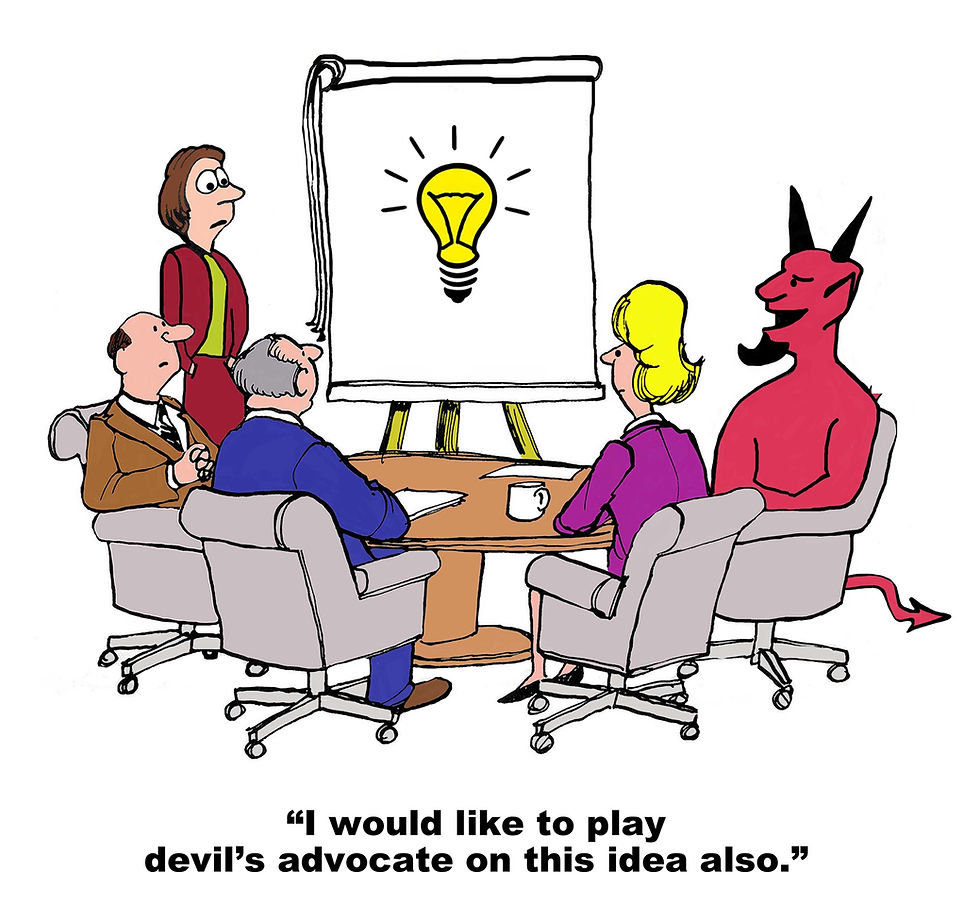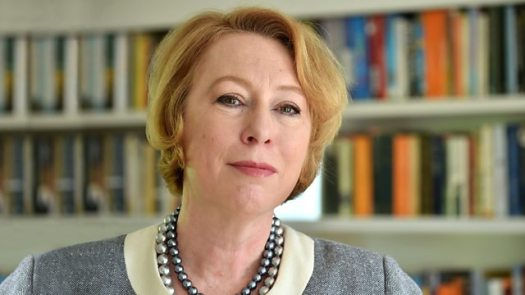Could a Devil's Advocate process prevent a Carillion situation in your business?
- Ciaran Fenton
- Jan 17, 2018
- 4 min read
Updated: Jan 19, 2018

It's easy to throw rocks at Carillion. As some of the reasons for its collapse are emerging, so are the grim implications for those immediately affected. These problems will have been complex and only those involved know the truth.
But all of us, in business, are affected and implicated, are we not? Do we all not stand in the same corporate governance glasshouse that we have jointly constructed, rocks at the ready? Could this, or a similar catastrophe, not easily happen in your business, your department, or to your board? None of us should feel entitled to schadenfreude.
The situation reminds me of the film Sliding Doors, in which we are presented with two alternative outcomes: one in which the main character just makes it through the closing doors of a train and the other, they don't. The movie proceeds to document the implications of these two alternate realities, popularising the expression: ‘a sliding doors moment’. It's a powerful image.
I wonder how many sliding door moments occurred at the main and operating boards at Carillion and in the meeting rooms of the contracting government departments? What decisions were taken when and by whom? Decisions that, in aggregate, led to this nightmare.
Or, what decisions were not taken, or conversations not had, or horizons not scanned and by whom? But crucially, was it safe to speak up?
Many will say that's the role of the non-executive directors: to ask the hard questions. But the power of NXDs is limited by the culture of the board, how much they're told and their own courage.
Or you might say that this is market forces properly, if brutally, at work. Cash is king. You can lose money forever but run out of cash only once. And, dress it up any way you like, Carillion ran out of cash. This is capitalism working. The strong survive. The weak go to the wall. Another gladiator bites the dust in the coliseum that is the City of London.
And technically you would be right, except that this analysis ignores one factor: society gave Carillion a mandate to trade and without that mandate, it could not have traded, or run out of cash.
So I say again: are we all not responsible for this? For the creditors, who will be lucky if they get a penny in the pound? For the families whose lives will be wrecked? For the further erosion of trust in business?
So what to do? Well, you can do nothing and nothing will change; or you can decide at your next board meeting that you want to put in place processes that would reduce these risks for your business.
Is your reaction that it can't happen to your business? That yours is too risk averse? That your corporate governance is perfect?
If that's what you think, stop reading this now, although you might benefit from reading How The Mighty Fail by Jim Collins. Hubris is reason number one.
But if you choose to take a courageous step and suggest change then you will be forced to confront the reason why all businesses go bust or experience, as the lawyers euphemistically like to call it, ‘a major risk event’.
Businesses run out of cash because of the decisions taken that result in the owners of cash pulling the plug.
There is no mystery here. The cause of failure will be in the decision- making processes unless it's a force majeure event. And even then, shouldn't force majeure be on your risk register?
So how can you ‘de-risk’ the decision-making processes in your boardroom, particularly on your operating board or ExCo where you have access to more information and real decisions are made?
What if at every main and operating board meeting in your business one member, by rotation, were appointed as the Devil's Advocate for that meeting with permission, nay the expectation, that they can say the unsayable, speak truth to power and challenge, for the sake of it, every key decision?
I suspect, if done properly, many key decisions would be either reversed or amended. But more importantly, many important matters - especially risky conduct, which is risky behaviour over time - would be called out.
But your Devil's Advocate would require a mandate to represent all stakeholders - not just shareholders and the banks, but creditors, large and small, employees, their families and the environment.
No chance you may say.
It matters. Why is Larry Fink, CEO of BlackRock, of all people, saying that "society is demanding that companies, both public and private, serve a social purpose"? (The Daily Telegraph, 17th Jan 2017).
Why did Philip Augar write, regarding the governance at one FTSE company that’s in trouble, that “none of the right questions had been asked”, and that “The alternative, carrying on as before, has already led to a fractured society..."? (FT, January 4th, 2017).
Why did Merryn Somerset Webb, the editor in chief of Money Week, write only last month (also in the FT) that since “most adults in the UK have a stake in the listed UK sector, they should know that - be able to act upon it”?
The reason these three are saying what would be unsayable ten years ago is because the zeitgeist is changing. Women are standing up to predatory men at work. Electorates are defying age-old voting patterns. And investors are seeing the writing on the wall for old processes.
They see that the current model isn't working. They also see that it's not a binary solution - capitalism versus socialism, but a midpoint which gives all stakeholders a say in matters which affect them.
Perhaps the term should be Stakeholder Advocate and not Devil's Advocate.
But if these arguments do not persuade you to implement a devil's advocacy process at your board meetings you might ask yourself why?
Is it because you're afraid? If you are, then the seeds of self-destruction are already sown in your organisation.
It's only a matter of time.





Comments